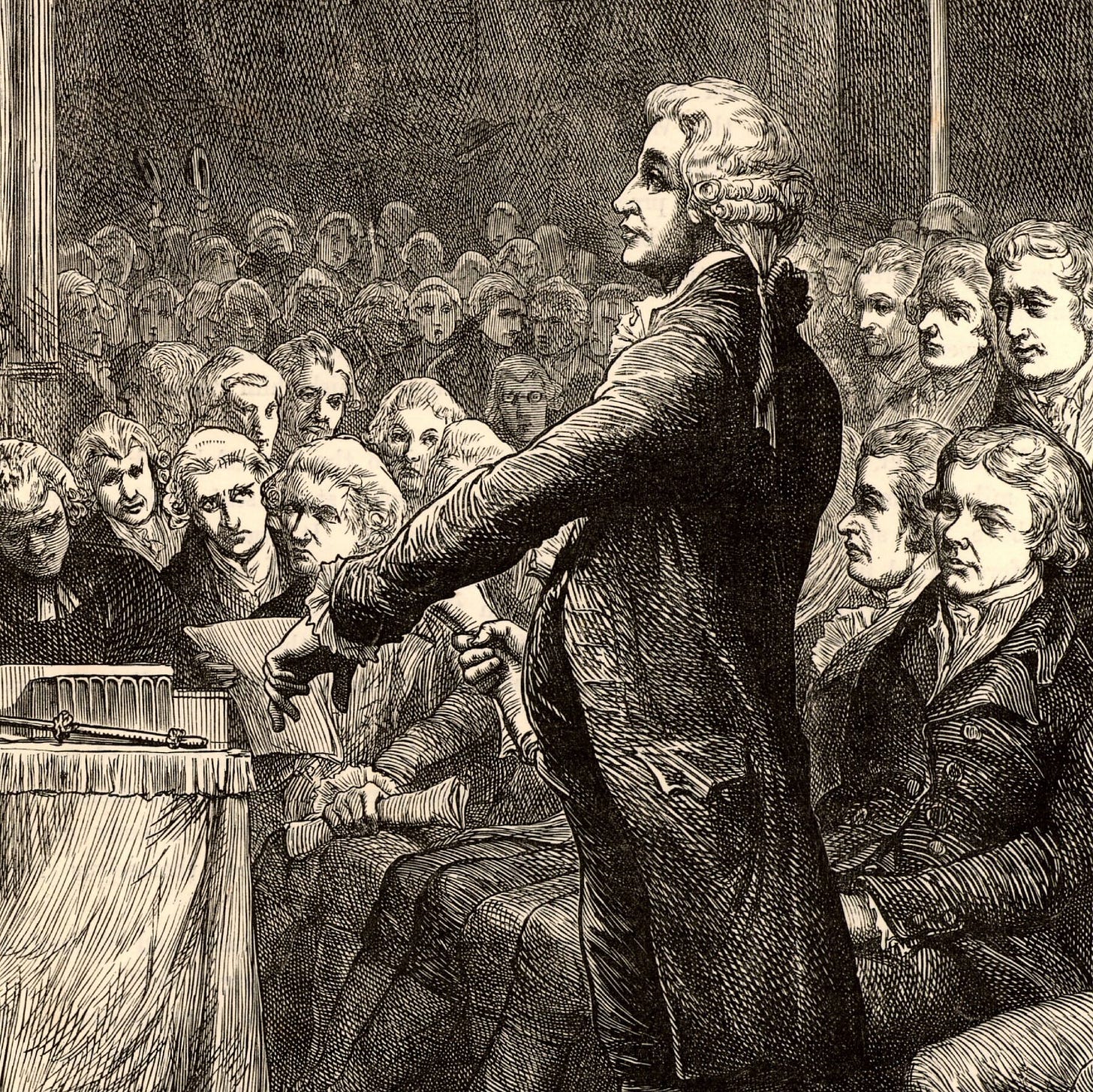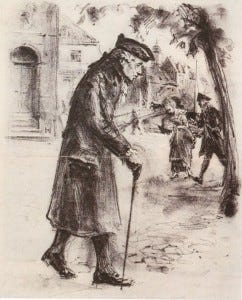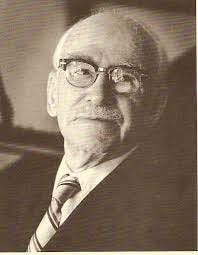It has been my great privilege that due to the study of ideas I have had some opportunity to see the ways of the old world. The world of Socrates, Descartes, Kant, Hegel, Bradley, Dr. Johnson, Burke, Blanshard, Shakespeare, Blake, Arnold, Eliot, and many many more. The world of letters, typewriters, elaborate dresses and wigs. The world of extreme civility (at least in part) and the world with a passion for ideas. I have always been fascinated by the ways of behaviour, ways of language. Spending sometime everyday in imagining - “How it must have been?” How it must’ve been to see Descartes teach philosophy to the queen of Sweden and die a tragic death due to the severe cold there? How it must’ve been to look out the window at 5 pm exact and see Professor Kant walking down the street? How it must have been to travel with Dr. Samuel Johnson as James Boswell did, writing down his ideas, asking him questions, witnessing his unparalleled wit first hand? How it must’ve been to be Edmund Burke himself and witnessing and reacting to the French Revolution? How it must’ve been to study at Oxford alongside Brand Blanshard and T.S. Eliot under geniuses like F.H. Bradley? The list of such questions is endless. One necessary thought then follows with a sigh, “I wish I was born then.”
But its not merely the cosmetic effect of the archaic world that I miss, but also the philosophy, the passion for ‘rational order’, the firm belief in universal presence of ‘reason’ in all humans and the firm belief in the ‘magical’ impact it would have, if men took some effort and put it to use. And it is not false. Philosophy is not some special endeavour but the combination of reflection and living, a ‘reflective’ life. Although it is true that some men reflect more clearly than others but it cannot be denied that all sane men have been blessed with this ability to reflect. I still remember shouting in a discussion with my parents in my early teens, “We got to first define what we mean by good, bad, success and failure!!”, it was only when I reached my twenties I came to know that Voltaire said this 300 years before me - “If you wish to converse with me, define your terms”. What a bummer! There have been many such instances, which show nothing but the gift humans have got. That power of reason, of reflecting I say, with the use of it, the layman too can arrive organically, naturally at most of ‘great’ ideas of ‘great’ men.
Anyway, the purpose of this post was imagination, but I have delved in the old world so much, it almost feels like reminiscing and not imagination. From that old world, one of the most recent friend of mine is, Dr. Brand Blanshard. He too in his days missed the old world and through his writings and lectures, opened a window for me, which showed me how it was, how it changed and made some prophetic declarations too. Sharing below, some excerpts from his lecture titled - “The Sane and the Eccentric in the Present Day Thought” (delivered in 1963), which he ends with a sombre note, with a prophetic declaration and an indication for our generation to cure ourselves, like a gyroscope.
“Being a student at (F.H.) Bradley's college at Merton with rooms a few steps away I had an excuse for seeing something of him. It is hard to convey to person's of another generation what an aura his name carried in those days. He never appeared at meetings, he never lectured or taught, many of the philosophy dons at Oxford had never so much as seen him, but they all were aware of him and afraid of him. There was sort of an electric field around the den where the old lion was hold up. He was formidable not only because he wielded his slashing dialectic and a stabbing pen but also because he was in a deadly earnest about his philosophy. It was his religion and his life.
Bradley's conception in philosophy was a dominant one in his time but in essence it was not new. It had come with some flourishes from Plato, Spinoza and Hegel. The business of philosophy was to understand the world and understanding means placing things in a system - at first, in a little one, when a child grasps the function of the chain on his bicycle, later, in a larger one, as when he sees why democracy must place limits on freedom, ultimately, in a complete one, in which nothing is left out. Thought is an activity, governed by an imminent end. That end has two aspects - one of these is, completeness, the embracing of all things within our knowledge, the other, is order, the grasp of that logical interdependence which all things have on each other if the world is really intelligible. This view made provincialism in philosophy almost a contradiction in terms. To test any piece of your knowledge you had to go beyond it. Then beyond that wider context to one still wider. Like the ripples from a pebble dropped in a pool. Certainty lay at the end of an infinite expansion. Common sense, Science and Philosophy are merely stages in one continuous effort of understanding, which is an effort to make everything intelligible through seeing its place in the system of things. The man who suffers from an intellectual cyst i.e. from any belief which resists criticism from his experience as a whole, is in that degree, less than sane. When we start talking with a man in an institution, he may seem a very sensible fellow, until he suddenly remarks, “I’m afraid I must set you right on one matter, you see, I am really Napoleon”. You may point out to him a thousand things that are inconsistent with his conviction, it is to no purpose that if you corner him, he may be dangerous. His insanity lies in a loss of perspective regarding one of his beliefs, he is not wholly irrational, but neither is any of us, rational, altogether. Sanity, Rationality is a matter of degree. Now, Bradley’s philosophy made Sanity in this large sense the end and criterion in the sphere of thought. There was a sense in which Ethics of those days, was an attempt to introduce the same idea into the sphere of practice.”“A hundred years from now men will look back with wonder that eminent philosophers insisting that the business of philosophy is with linguistic usage, that eminent theologians pronouncing the reliance on reason to be sin, that eminent moralists reducing moral judgements to ‘boos and hurrays’, that eminent psychologists refusing to call Greek culture better than Polynesian, that eminent artists straining after the meaningless, of eminent poets flocking to the code of unintelligibility.
But the human mind after-all is something of gyroscope and tends in time to right itself and its past gives us some idea of what righting itself would mean. The main tradition in Philosophy is one that runs down from Plato, through Hegel, to Whitehead, a tradition that has stood for system and sweep of vision and it will come back. The main tradition in Ethics, is one that has run from Aristotle, through Spinoza to (Joseph) Butler, (Robert) Greene and (F.H.) Bradley, it too, will come back. There’s a great tradition in Criticism that has run from (Cassius) Longinus, through (Johann Wolfgang von) Goethe, to (Matthew) Arnold and in its best in (T.S.) Eliot, surely that will revive. These traditions are not really dead, they are only sleeping. And this shrill shout of mine is an attempt not so much to wake them up, as to make them toss in their sleep and perhaps even breathe.”
Dr. Blanshard was 71 when he delivered this lecture (in 1963). Since then 59 years have passed. We are beyond the half mark in his prophetic declaration. And I believe, he was right, for now at least a few men, including myself are looking back in wonder, trying to make sense of how new ideas seeped in and eradicated the older ones. And there is always some embarrassment that comes along while advocating for the older world, people view the advocate with skepticism, the advocate is disdained, for who wishes to leave the great modern world and return to a primitive archaic world? And why should one conform to such madness? But one must ask and answer this with utter honesty, What was so intolerably wrong with the older world? What have we lost? Could we gain anything from bringing it back, at least in part? Let us not forgo the inquiry because of the chance of yielding an unfavourable conclusion.
There is a feeling of alienation in this modern world, a feeling of lack of belonging. A lack of possession, a lack of organic love for the world as it is. The force with which ‘progress’ is imposed on men, what good does it do? All such questions indicate to one essential point that - Time is not with compartments, it is only our inability to see things in their true extent, that we compartmentalise, differentiate between old and new, the ‘obsolete’ and the ‘relevant’, the ‘useless’ and the ‘useful’. After all I think that the Past, the Present and the Future are not the characteristics of Time but of our vision that we superimpose on the ever flowing river of Time to make sense of it. Life was there before, as is now, as will continue to be. What then was so wrong, with the older life, that the older ways of thinking have been knocked out cold?
The case that I have presented is somewhat pertaining to Philosophy, but if one thinks about it, its universality might reveal itself. Change must take place, it always does, sometimes even without our consent, but a ‘Why?’ must always be asked to the change. After all human life is a tradition, a rather unbroken, continuous tradition of living, then all change must necessarily be linked to the inherent, essential condition of men, vital for living. What then it means to live? To merely survive? To merely not be eradicated? The issue of any tradition boils down to - What we have inherited from the dead and what we owe to the unborn, would it not then be foolish to discard our inheritance? How could we then expect the future to not put us to a similar fate? Hence I invite you to ponder upon this, for sometime, and if the rebirth is impossible, write a respectful obituary for the lost, the dead and the fallen.









Glad. Expecting more detailed comments from you : )
You glorify
The doctors
The lecturers
The writers
The philosophers
You prefer to imagine them
Cloaked in truth & virtue
Than sitting on the toilet
Your strategy is to namedrop
And philosophy-hop
Through the puzzle of life
This ignorant fool
Has a question for you
Have you figured it out yet
That there is nothing to figure out?